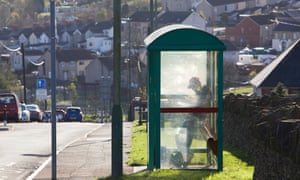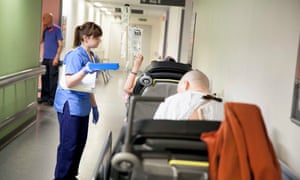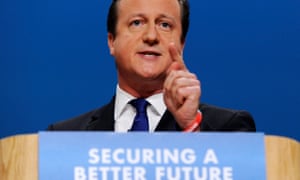
Simon’s death certificate tidies away his life in a few terse official phrases. Date of death: 12 November 2017. Causes: “a) Fatty liver” and “b) Alcohol misuse”. No bureaucratic curiosity about how a 51-year-old’s life came to be cut so short.
Which leaves his only brother, Dave, dealing with the grief and asking all the whys. Why did Simon die so young? Why did no one else try to help?
No obituaries will be written for Simon, no plaques mounted, no tributes passed by politicians. But if you want to understand how Britain fails so many people in so many places, it’s stories like his you need to study.
Some people’s lives are like arrows, flying straight to their destinations. Not Simon’s. The Rhymney Valley, in south Wales, is where he was born and died, but it wasn’t where he spent most of his adult years, and it was never where he meant to land up. Bright boys, he and Dave had one notion drummed into them: get an education, and get out. On TV, Dave remembers, “We’d see the yuppie revolution going on in London – the Porsches and the red braces. It may as well have been another country.” For them, Thatcher meant mines closing, factories shutting, men being laid off in their thousands, and families going under.
Yet there are so many people like Simon, all surplus to requirements of this shrunken economy
Both sons flew away. Simon was the high-flyer, leaving Wales to do a science degree, going to Cambridge for postgraduate study, and becoming a software engineer with a giant defence firm. He married and settled far away, in Bushey, on the outskirts of London. He had got on his bike; he had looked for work. Now he was earning three times what his younger brother was making, and raring to join the yuppies.
Just as he was starting to live the dream, the dream fell to bits. He got divorced. He got laid off. Then their mother’s breast cancer returned – this time for good. The prodigal son moved back, moved in, and became her carer. Dave doesn’t remember him complaining once during the years their mother spent deteriorating and then dying.
Such setbacks await all of us, but one test of any civilised society is how well it supports us through them. In Simon’s case, Britain botched this test – over and over again. By the time his mother died, he had spent seven years outside the job market. It was 2007, the start of the credit crunch, and the economy was slowing. Even in boomtown London such a gap on the CV would have raised recruiters’ eyebrows. Here in south Wales, where jobs were already scarce, it was the kiss of death. Besides, it simply did not have positions for Si, with his Cambridge postgrad and software engineering background.
Simon “spent 25 years building up to be somebody”, says Dave. A quarter-century observing the social mobility rules laid down by Margaret Thatcher and Tony Blair. He had aspired, he’d grafted, he’d kept his side of the bargain. But while social mobility trumpets opportunity for individuals, it ignores the communities where those people live. The result was that Simon’s ambitions had outgrown his home, and now he was trapped.
Dave showed me the small terrace house their mother passed on to Simon, where he spent the last years of his life. No one was about as we walked through the speck of a village – just two long rows of cars parked outside the train station. This is the new Welsh commuter class that economists such as Cardiff University’s Calvin Jones talk about, the people who travel from the valleys to staff the call centres, shops and other minimum-wage employers in Cardiff or Newport.
Governments in Westminster and Cardiff Bay have spent decades promising to rebuild the shattered economy of south Wales. Serious money has been spent on shopping malls, new motorways and sweeteners for big business. Each time, the firms come, take the cash and – at best – leave a few poverty-paying jobs. You see the same cycle in so many deindustrialised parts of Britain. And each time, the politicians learn no lessons, and try the same thing again.
A few minutes from Simon’s old home is the town of Bargoed, where the greatest excitement in recent years was the opening of a Morrisons. Much of the rest of the high street is just memories: a huge statue to commemorate dead miners, the chapel turned into a library, and shop after shop with its shutters pulled down for good.

A rural bus services in Fochriw village, Bargoed. South Wales is one of the poorest regions of the UK. Photograph: Martin Argles for the Guardian
Simon signed on at the jobcentre, which told him to apply for 35 jobs a week. He sent off to become a teaching assistant, a warehouse operative, all the minimum wage jobs going. Barely an application led to an interview. Sometimes, “angry and very down”, he’d miss his targets or appointments. He would get sanctioned, go broke, and have to call on Dave to tide him over.
After years of knockbacks, Simon declared he’d never be able to work again. It came almost as a relief. “It meant he didn’t have to think of himself as such a failure. Now he could be a victim.”
Simon had always been a pub man. But now he’d get up in the morning and start on a glass of watered-down scotch and a sci-fi DVD. By the end of a day, he’d have finished the DVDs, his fags and an entire bottle of Scotch. Why does Dave think no employer wanted him? His answer comes back in a small, tight voice. “No one wants a 50-year-old, unemployed, overweight, drinking guy on the books, do they?”
Yet there are so many of them, all surplus to the requirements of this shrunken economy. A GP in Bargoed estimates that up to one in 10 of her patients have some kind of drink or drug addiction. Up to one in three suffer depression or anxiety. In these parts, a newborn boy can expect to live just over 61 years in good health; in the richest parts of London, it’s 75 years.
Having been one of Blair’s strivers, Simon was now one of George Osborne’s skivers. He was moved on to disability benefits, before the Department for Work and Pensions assessors declared him fit for work. His money would periodically stop until his GP contested the verdict. This spring, he was moved on to universal credit, which meant six weeks with barely a penny. Again and again, it was Dave who had to bail him out. It was Dave who suggested jobs Simon could apply for, small businesses he might start. The younger brother was filling in for the state, while Si lived in ripped clothes and ate junk. “The government was abusing a vulnerable man.”
Alcoholic Simon would go to the local NHS drink service once every few weeks – and every few months, he’d end up in such a bad state he would be admitted to hospital. They’d “dry him out, then spit him out”, says Dave. According to the thinktank the Nuffield Trust, the Welsh health system is underfunded by £500m a year.
Simon died in his small house, waiting to go back into hospital to dry out. He grew up in a town with men who’d had to dig out children from the Aberfan mining disaster; he died the year Grenfell Tower burned down. When such obvious tragedies strike, the politicians and the press vow to tackle the social injustices that caused them. But Simon was just one man dying in plain sight of his neighbours, his family and state officials. Far easier to chalk up his death to a fatty liver and booze, rather than inequality and austerity and the false promises peddled by politicians from Thatcher to May. A dead man, a dying town: he spent his last days being told he’s fit for work in an economy that has next to no work.
What’s left is a younger brother beating himself up about what he should have done and angry at others for letting them both down.
Before we part, Dave asks: “Why wasn’t there someone who could step in and help? Is that naive of me? To think that a modern, 21st-century society could do that for people who need it?”
The names in this piece have been changed and details obscured in order to protect the identity of Simon’s family

